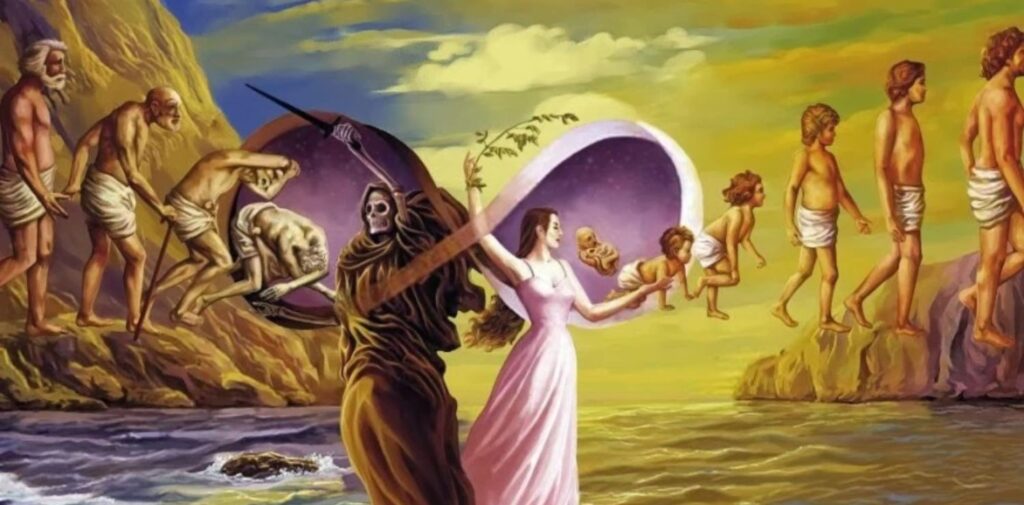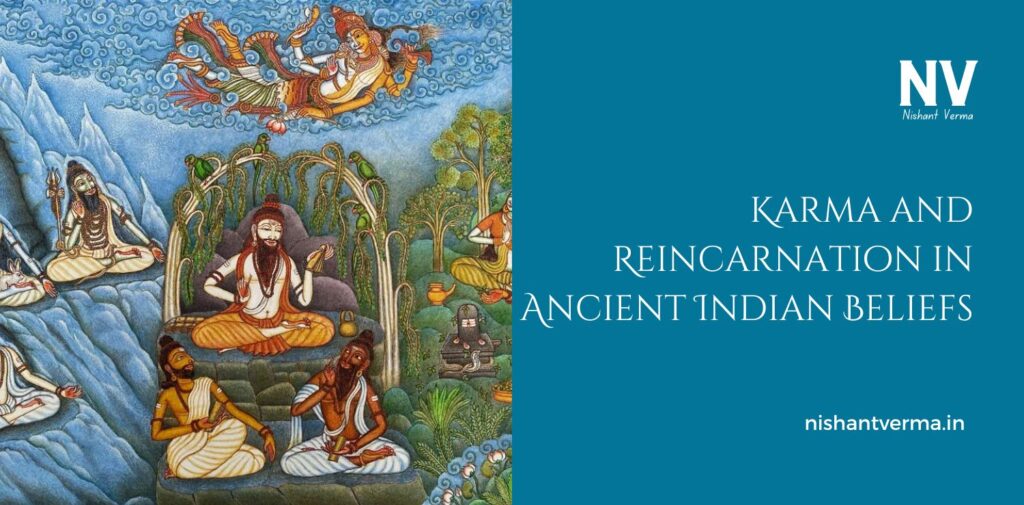In ancient India, people believed in ideas that were very different from those of today. Two of the most important beliefs in Indian culture were Karma and Reincarnation. These beliefs are still a big part of life for millions of people today, but they have been around for thousands of years. Let’s explore these concepts in simple language, so even a small child can understand.
What is Karma?
Karma is an important idea in many Indian religions, such as Hinduism, Buddhism, and Jainism. The word “Karma” means action or deed. It is the belief that every action we take, whether good or bad, will affect our future. Think of it like a boomerang: when you throw something, it comes back to you. In the same way, when you do something, it will come back to you in the future.
- Good Actions Lead to Good Karma: If you do good things, like helping others, being kind, and telling the truth, good things will happen to you later. This is called good karma.
- Bad Actions Lead to Bad Karma: If you do bad things, like hurting someone, lying, or being mean, bad things will happen to you later. This is called bad karma.

Rule of Karma: “What Goes Around, Comes Around”
In simple words, karma means that the world is fair. If you are kind and helpful, you will receive kindness and help in return. If you are selfish or hurtful, you will face difficulties because of your actions. It’s like planting seeds: if you plant good seeds, you will grow good fruit. If you plant bad seeds, you will get bad fruit.
This rule of karma is not just about big actions; it is about everything we do. Even our thoughts and feelings can create it. So, it’s important to always think good thoughts and treat others with respect and love.
Connection Between Karma and Reincarnation
Now that we know what it is, let’s talk about Reincarnation. Reincarnation is the belief that after we die, our soul (the real part of us that is inside our body) does not disappear. Instead, it is reborn into a new body. This new life could be in another person, an animal, or even a plant.
In ancient Indian beliefs, people believed that the soul is immortal, which means it never dies. After a person dies, their soul leaves the body and is born again. This cycle of birth, death, and rebirth is called samsara.
But why does a soul keep being reborn? This is where karma comes in.
- If someone lived a good life and created good karma, their next life would be better. They might be born into a happy family or live in a peaceful place.
- If someone lived a bad life and created bad karma, their next life might be difficult. They might be born into a poor family, face struggles, or have a hard time.
How Karma and Reincarnation Work Together
Think of karma and reincarnation like a story. In the story, you are the main character. Every action you take in this life will affect your next life. If you do good things, you will create good karma, and in your next life, you might have a better life. If you do bad things, you will create bad karma, and your next life might be harder.
This cycle of life, death, and rebirth continues until the soul reaches a state of perfection. When the soul has learned everything it needs to, and has created enough good karma, it can finally break free from the cycle of reincarnation. This is called moksha in Hinduism. Moksha means the soul has reached complete peace and union with the divine (God). It no longer has to be reborn again.

Idea of Karma in Everyday Life
In ancient India, people believed that understanding karma was important for living a good life. Here’s how it was important in daily life:
- Making Good Choices: If you knew that your actions today would affect your future, you would want to make good choices. People in ancient India tried to live good lives by being kind, helping others, and being honest. They believed that this would bring them happiness in the future.
- Learning from Mistakes: If someone did something wrong, they believed that it was because of their bad karma from the past. So, they tried to learn from their mistakes and do better in the future. This helped people grow and improve.
- Respect for All Living Things: Since all actions created karma, people learned to respect everything around them, including animals and plants. They believed that every living thing had a soul and that causing harm to others would lead to bad karma. This is one of the reasons why many people in India follow a vegetarian diet—to avoid harming animals.
Reincarnation: The Endless Journey of the Soul
In ancient Indian beliefs, reincarnation was not just about being reborn into a new body; it was about the journey of the soul. The soul learns important lessons through many lives. Each life gives the soul a chance to improve, become wiser, and grow spiritually.
Here’s an easy way to think about it:
Imagine you are a student in a school. In each class, you learn new things. Sometimes you make mistakes, but each mistake helps you learn and do better next time. When you finally pass all the tests and learn everything you need to know, you graduate! In the same way, the soul keeps learning and growing through many lives until it is ready to be free from the cycle of rebirth.
Reincarnation and the Importance of Karma in Indian Religion
In ancient Indian religions like Hinduism, Buddhism, and Jainism, the ideas of karma and reincarnation were central to their teachings. These religions believed that the goal of life is not just to enjoy the world but to learn spiritual lessons and improve one’s soul.
- Hinduism teaches that through good karma, one can move closer to moksha, the freedom from the cycle of rebirth.
- Buddhism teaches that following the Eightfold Path (a way to live a good life) helps people create good karma, which leads to nirvana—a state of peace and freedom from suffering.
- Jainism also believes in karma and reincarnation. Jains believe that by following strict rules of non-violence (ahimsa), they can avoid bad karma and reach liberation (moksha).

How Karma and Reincarnation Affect Us Today
Even though these beliefs began thousands of years ago, they are still important today. Many people in India and around the world continue to follow the teachings of it. These beliefs encourage people to live good lives, be kind to others, and respect all forms of life.
In modern times, people who believe on it often use these ideas to:
- Be more compassionate towards others
- Forgive others for their mistakes, understanding that everyone is on their own journey
- Live in a way that creates good karma, by doing good deeds, helping others, and being mindful of their actions
Conclusion: Karma and Reincarnation in Ancient Indian
The concepts of Karma and Reincarnation in Ancient Indian are deeply rooted in spirituality.it teaches us that every action has a consequence, while reincarnation shows us that our soul’s journey never ends. By living a good life , we can improve ourselves and our future lives. These beliefs remind us that we are all connected, and the choices we make today shape who we will be tomorrow.
Even though these ideas come from ancient India, they still help people live better lives today. By understanding , we can strive to be better, kinder, and more loving, knowing that our actions today will follow us in the future.




